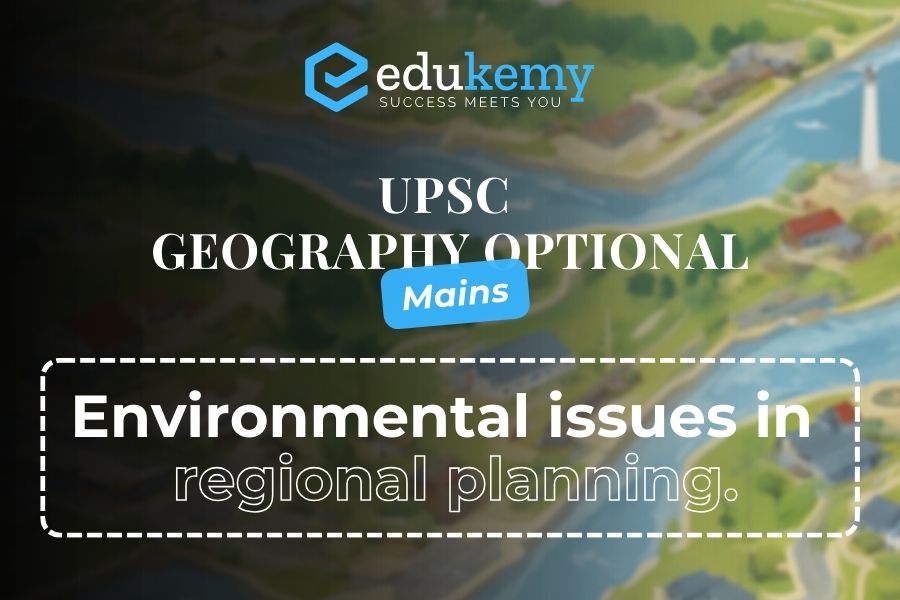
Explore the critical discourse surrounding the insufficient integration of environmental concerns in regional planning, as per the UPSC Geography Optional Mains exam for 2021. Examine the ramifications of overlooking environmental issues in regional development strategies, including habitat degradation, resource depletion, and climate change impacts. Delve into the complexities of balancing economic growth objectives with environmental conservation imperatives within regional planning frameworks. Comment on the challenges faced in incorporating environmental considerations into policy formulation, implementation, and monitoring processes at regional levels. This analysis provides a nuanced perspective on the gaps and opportunities in addressing environmental concerns within the context of regional planning, essential for fostering sustainable development practices.
Contents
Answer:
Regional planning involves developing strategies for land use, infrastructure, and overall development within a specific geographical area. Unfortunately, environmental concerns often take a backseat in these plans, posing significant challenges.
Environmental issues are not adequately addressed in the regional planning:
Lack of Priority: Environmental considerations are frequently overshadowed by economic and developmental priorities in regional planning.
- Economic priorities often overshadow environmental concerns in projects like the Sardar Sarovar Dam, where developmental gains are prioritized over ecological impacts.
Short-term Focus: Plans often prioritize short-term gains, neglecting the long-term environmental
impacts of infrastructure projects and industrial activities.
- The emphasis on rapid urbanization, as seen in the expansion of cities like Bengaluru, neglects the long-term environmental repercussions, including water scarcity and habitat degradation.
Inadequate Regulation: Environmental regulations may exist, but enforcement and monitoring
mechanisms are often insufficient, allowing unchecked harm to ecosystems.
- Despite environmental regulations, projects such as the POSCO steel plant in Odisha faced accusations of environmental degradation due to insufficient regulatory oversight.
Urbanization Pressures: Rapid urbanization contributes to issues like urban sprawl, resulting in habitat loss, increased pollution, and strain on natural resources.
- The urban sprawl in Delhi-NCR has led to severe air pollution, loss of green cover, and stress on water resources, showcasing the environmental toll of rapid urbanization.
Inadequate Mitigation Measures: While planning may acknowledge environmental impacts, mitigation measures are often inadequate or not fully implemented.
- While the Chennai-Bengaluru Industrial Corridor promises economic growth, the adequacy of measures to counter its environmental impact remains a concern.
Political Influence: Political considerations may sway planning decisions, leading to choices that favor economic interests over environmental sustainability.
- Political considerations have influenced decisions like the clearance of mining projects in the Western Ghats, illustrating the sway of economic interests over environmental preservation.
Limited Public Participation: Involving the community in decision-making processes is crucial, yet regional planning often lacks mechanisms for genuine public participation.
- The planning and execution of the Polavaram Dam project in Andhra Pradesh lacked substantial public participation, sidelining local communities’ concerns about environmental consequences
Way Forward:
Integrated Planning: Ensure integration of environmental considerations into every stage of regional
planning, emphasizing sustainable practices.
- The Smart Cities Mission should integrate sustainable practices, learning from initiatives like the green city planning in Gandhinagar, Gujarat.
Strengthen Regulations: Enforce and strengthen environmental regulations, with transparent monitoring systems to hold violators accountable.
- Strengthening regulatory frameworks, as demonstrated in the case of the Coastal Regulation Zone (CRZ) notifications, is imperative for preserving coastal ecosystems.
Long-term Vision: Encourage planners to adopt a long-term perspective, considering the enduring impact of development on the environment.
- Sustainable city planning in Lavasa exemplifies a long-term perspective, emphasizing environmental conservation alongside urban development.
Interdisciplinary Collaboration: Promote collaboration between environmental experts, urban planners, policymakers, and communities for holistic and effective regional planning.
- Projects like the Chennai Rivers Restoration Trust showcase the benefits of interdisciplinary collaboration between experts, policymakers, and communities in environmental restoration.
Conclusion:
Prioritizing environmental sustainability is not just an ethical choice but a pragmatic one for ensuring a balanced and resilient future. By addressing these shortcomings, we pave the way for a more sustainable
coexistence between development and the environment in regional planning.
In case you still have your doubts, contact us on 9811333901.
For UPSC Prelims Resources, Click here
For Daily Updates and Study Material:
Join our Telegram Channel – Edukemy for IAS
- 1. Learn through Videos – here
- 2. Be Exam Ready by Practicing Daily MCQs – here
- 3. Daily Newsletter – Get all your Current Affairs Covered – here
- 4. Mains Answer Writing Practice – here

